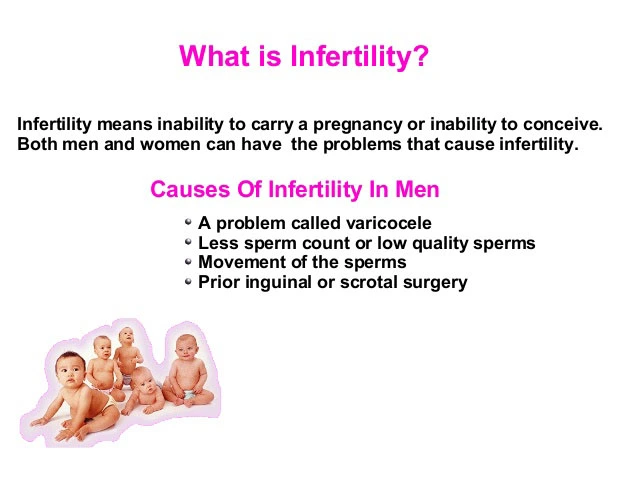- Infertility today is no longer constricted to be a female problem. In fact the term infertility is a broad term often loosely used. It actually refers to a range of disorders found both in males and females which contributes to a childless couple. WHO (World Health Organization) defines infertility as failure to conceive despite two years of cohabitation and exposure to pregnancy.
- India, though a constantly globalizing country economically and in other aspects, in terms of infertility, still hides under the shroud of oblivion, refusing to face the truth. Studies have however shown that male infertility is almost as high as women in India. One of every five healthy men between the ages 18 – 25 suffer from abnormal sperm count.
- According to a report conducted by the International Institute of Population Sciences, infertility is growing at an alarming pace, especially in the cities.
- The report said that in India, 13 percent of ever-married women aged 15-49 years were childless in 1981 (rural 13.4 percent and urban 11.3 percent) which increased to 16 percent in 2001 (rural 15.6 percent and urban 16.1 percent). Over half of married women aged 15-19 years were childless in 1981, which increased to 70 percent in 2001.
- The best infertility clinics around the world have a success rate of about 40-50 percent. In other words, 60 – 50 percent of ART (Assisted Reproduction Technology) treatments remain unsuccessful. In some cases the ART cycle maybe repeated to achieve success while in others, medical experts will be able to provide a definite cause for failure. However there are also cases where doctors are unable to explain the cause for an unsuccessful pregnancy or why the treatment failed.
What is the Definition of Infertility
Infertility refers to the inability of a person or couple to achieve a clinical pregnancy after 12 months of regular, unprotected intercourse— or after six months when the woman is aged 35 or older. According to the WHO and ICMART, it’s considered a disease of the reproductive system involving difficulty conceiving, sustaining a pregnancy, or delivering a live birth. Infertility includes primary (never having conceived) and secondary (difficulty conceiving after prior pregnancy) forms. It may stem from male, female, combined, or unexplained causes; globally, about 15% of couples are affected
Frequently Asked Questions About Infertility
How common is infertility in India?
Infertility in India affects an estimated 10–15% of couples, and the number is rising due to lifestyle changes, stress, and delayed pregnancies. At Sumiran Hospital, we specialize in advanced infertility treatments, offering personalized care to improve the chances of conception for couples across the country.
What are the types of infertility?
Infertility is generally classified into two main types:
- Primary Infertility – When a couple has never been able to conceive after at least 12 months of regular, unprotected intercourse.
- Secondary Infertility – When a couple has conceived in the past but is unable to conceive again.
Both types can be caused by male, female, combined, or unexplained factors. At Sumiran Hospital, we offer advanced diagnostic tests and personalized treatment plans to address all forms of infertility, helping couples achieve successful pregnancies.
Can you overcome infertility?
Yes, in many cases, infertility can be successfully treated or managed with the right medical care. Advances in reproductive medicine—such as IVF, IUI, fertility medications, and lifestyle modifications—have helped millions of couples conceive. The key is timely diagnosis and personalized treatment. At Sumiran Hospital, our fertility specialists use advanced technology, holistic care, and proven treatment protocols to address both male and female infertility. With early intervention and expert guidance, many couples can overcome infertility and fulfill their dream of becoming parents.
How is female infertility diagnosed?
Female infertility is diagnosed through medical history review, hormone tests, ovulation tracking, ultrasound scans, and imaging like HSG to check reproductive organs. At Sumiran Hospital, we use advanced diagnostics to quickly find the cause and recommend the best treatment for successful conception.
How is male infertility diagnosed?
Male infertility is diagnosed through medical history, physical examination, semen analysis, hormone tests, and sometimes ultrasound or genetic testing. At Sumiran Hospital, our experts use advanced diagnostic methods to identify the cause and provide effective treatments to improve fertility outcomes.
